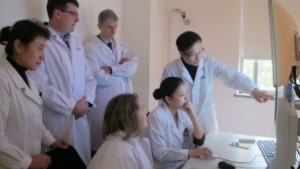15th December 2015 Beijing, China
use high intensity focused ultrasound technology to treat uterine fibroids
Early in December, I accompanied John Pearson Deputy Head of China Department, FCO, Tina Redshaw CG and Mark Watchorn DCG to visit Chongqing Haifu Medical Technology Inc. and the Haifu Hospital in Chongqing. This was my 7th time to visit Chongqing Haifu.
Chongqing Haifu and its UK partners have been trying to use high intensity focused ultrasound (HIFU) technology1 to treat uterine fibroids, which are benign smooth tumours of the uterus. Uterine fibroids can cause pain, bleeding and infertility in women of childbearing age. Between 20% to 80% of women develop fibroids by the age of 50. In 2013 it was estimated that 171 million women were affected globally.
Previous research suggests HIFU offers a major advance in treating uterine fibroids. HIFU can treat this condition with a single 1-2 hour treatment under sedation, whereas the alternatives are unpleasant. Hormonal treatment needs to be taken for long periods. Surgery of the uterine artery may affect fertility. Surgery poses the risks of complications and requires a recovery period of several months.
In order to establish the benefits of HIFU beyond doubt, the UK-Chongqing Haifu research team is now planning a multicentre international randomised controlled trial. This initiative arose shortly after the research teams had a review meeting in the UK in 2011. Science & Innovation (SIN) Network organised and sponsored the trip. In support of this initiative, Chongqing Haifu has committed £1.47 million in kind for clinical research in Centres involved – four in the UK and four in China since then.
Led by Prof. Freddie Harmdy, Chair of Surgery at Oxford, the research team ticked off an initial Prospective Exploration Study in the UK involving around 120 patients at Oxford, Birmingham and Cardiff Universities and University College London, beginning this autumn. This one year study will allow doctors at these centres to acquire expertise in HIFU under careful mentoring, and will allow evaluation of the outcome of the treatment – both therapeutic and adverse effects. The research teams are also planning a qualitative study to learn what patients think about the treatment and the alternatives, and whether they would participate in a randomised study. After a year, analysis of the results, together with those from China, should allow the research teams to move on to a larger international randomised study comparing HIFU to uterine artery surgery.
Transfer of trials know-how, the methodology for conducting Clinical Trials of surgery to Chinese clinicians will be a valuable. Evidence-based clinical trials are vital for health and medical progress in China. It is essential to produce the high-quality evidence needed to improve the quality of health care in China and for decision / policy making.
This is a great example of the value of perseverance and continued support from the Science and Innovation Network. At the personal level, this is why I like working for the Science & Innovation Network when I see the UK and China actually carrying out operations which will make a fundamental difference in global health.
1. High intensity focused ultrasound (HIFU) is an innovative technology which allows very precise targeting of areas of tissues in the human body with powerful ultrasound waves capable of destroying tumours and other harmful abnormal tissues. In 2015, HIFU surgery for solid cancer treatment was added to the NHS healthcare list.
